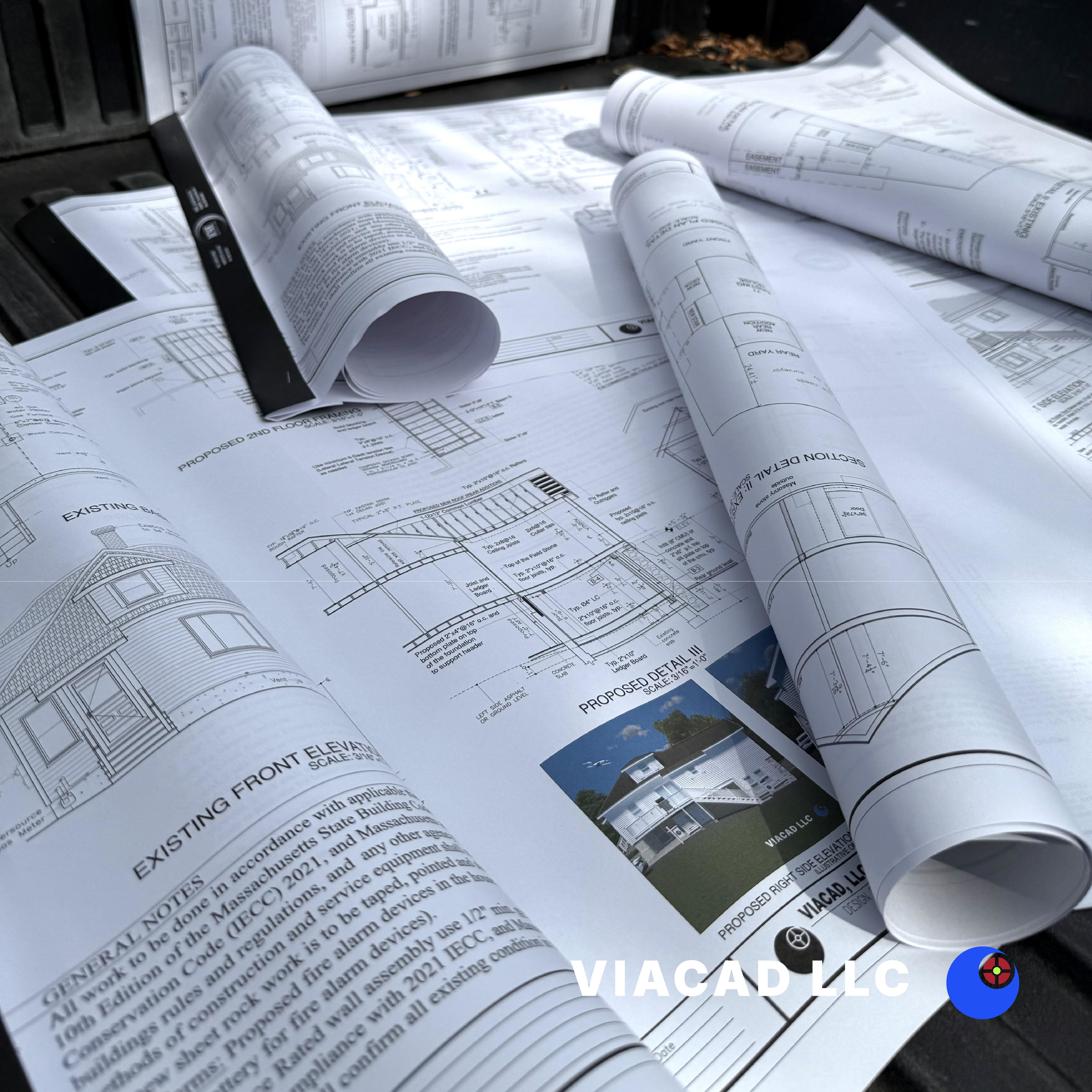
NOTE: VIACAD, LLC specializes in developing and producing detailed building plans (construction blueprints) for both residential and commercial projects across Massachusetts with more than 18 years of experience in design & construction producing professional permit-ready drawings for homeowners, builders, developers, and businesses.
Stone foundations are a hallmark of many older homes throughout Massachusetts, especially in historic areas like Boston and Central Massachusetts. These foundations, often constructed from fieldstone or other natural stone materials, are commonly known as a fieldstone foundation and require specialized care. They provide a charming and durable base for homes built generations ago. However, over time, mortar joints between the stones can deteriorate due to weathering, moisture, and natural wear, leading to common issues such as cracks, loose mortar, and gaps. Understanding how to repoint a stone foundation in Massachusetts is essential for homeowners aiming to preserve their home’s stability, repair damage, prevent structural damage, and maintain its beauty.
NOTE: Information provided here is for educational purposes only.
Stone foundations, particularly fieldstone foundations, have been used for centuries in New England, offering a robust and aesthetically pleasing base for homes. These foundations rely on mortar joints to bind the stones together, ensuring the structural integrity of the wall. The mortar, traditionally made from lime mortar and sand, acts as a cushion and sealant, preventing water infiltration and providing long-term stability. Over time, however, mortar can crumble or deteriorate, creating entry points for moisture, pests, and dirt, which can compromise the foundation’s durability. Preserving the home’s foundation and restoring its original strength and appearance is crucial for maintaining both structural integrity and curb appeal.
Maintaining stone foundations is essential not only for preserving your home's foundation but also for enhancing energy efficiency and preventing issues such as mold growth and rodent activity. When mortar joints begin to fail, water intrusion can lead to basement water problems, further exacerbating foundation damage.
Homeowners in Massachusetts often encounter several common issues with their stone foundations. These include crumbling mortar joints, loose mortar, cracks in the stone or mortar, holes that may form in the foundation walls, and gaps that develop between stones. Such deterioration can be caused by a variety of factors including freeze-thaw cycles, water infiltration, and general weathering over time.
Left unaddressed, these problems can lead to more serious concerns like structural damage, mold growth, and compromised basement walls. Water intrusion not only threatens the foundation’s stability but also can cause significant damage to the home’s interior spaces. Therefore, recognizing the signs of deterioration early is crucial to preventing costly repairs, such as identifying a crack before it worsens.

Repointing stone foundations is the process of removing deteriorated mortar from the joints between stones and replacing it with fresh mortar, as well as repairing any damaged areas. This restoration technique is essential for maintaining the structural integrity and longevity of your home’s foundation. Foundation repointing fills in cracks and gaps, strengthens the wall to further strengthen the foundation and ensure its long-term durability, and restores the protective seal that prevents moisture and pests from entering. This process is a key component of stone foundation restoration, helping to preserve both the structural integrity and historic character of your home.
Using the right materials is critical for a successful repointing project. Lime mortar is often recommended for repointing stone foundations in Massachusetts due to its breathability and flexibility, which allows the foundation to move slightly without cracking. This contrasts with modern cement mortars, which can be too rigid and cause further damage to older masonry.
The repointing process begins with a thorough inspection of the stone foundation to identify areas with loose or crumbling mortar. Next, the old mortar is carefully removed using hand tools or specialized equipment to avoid damaging the stones. It’s important to remove mortar to a sufficient depth to ensure the new mortar bonds properly.
After cleaning the joints, a carefully mixed lime mortar is applied to fill the gaps between the stones. This mortar is then carefully smoothed and shaped to match the original appearance, preserving the aesthetic of the foundation. The repointing team must pay meticulous attention to detail to ensure the mortar cures properly and provides a long-lasting solution. Each job requires careful planning and execution to achieve the best results.
Once the mortar has set, additional measures such as basement waterproofing may be recommended to protect the foundation further from water intrusion. This might involve sealing the basement walls or installing drainage systems to divert water away from the foundation.
Hiring a fully licensed and experienced waterproofing contractor or masonry restoration team in Massachusetts ensures that your repointing project is handled with expertise and care, offering a full range of service options for your foundation needs. Professionals understand the unique challenges posed by older stone foundations and employ techniques that preserve the home’s stability and beauty.
A professional team can also coordinate foundation repairs alongside waterproofing services to address water intrusion issues comprehensively. Their knowledge helps prevent future deterioration, mold growth, and structural damage, and ensures that any cracks or leaks are properly repaired, safeguarding your property for generations to come.
After completing a foundation repointing project, ongoing maintenance is essential to preserve the integrity of your stone foundation. Regular inspections can help detect early signs of mortar deterioration, cracks, or moisture problems. Keeping the surrounding area clear of dirt and debris reduces the risk of water pooling near the foundation, which can lead to further damage.
Proper waterproofing of basement walls and ensuring good drainage around the property are also vital steps to maintain the foundation’s durability. Applying a waterproof coating can further protect your foundation from moisture damage. By addressing these factors, homeowners can protect their investment and enjoy a strong, beautiful foundation for years.
Knowing how to repoint a stone foundation in Massachusetts is crucial for homeowners with older homes featuring fieldstone foundations. Repointing stone foundations not only restores the mortar joints but also strengthens the entire foundation, preventing water infiltration, mold growth, and structural damage. Utilizing lime mortar and employing meticulous techniques ensures a long-lasting solution that preserves both the functionality and historic beauty of your home’s foundation.


Currently accepting projects in Massachusetts.